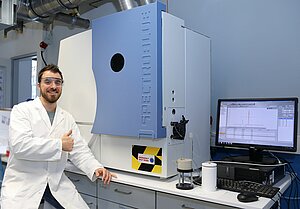Oxygen evolution is the key reaction to make water electrolysis for the production of hydrogen and oxygen feasible. In the design of new and durable catalyst materials for this reactions, unwanted impurities, e.g. from the electrolyte, can severely influence the reaction and the behavior of these catalysts.
To avoid misinterpretation, a team of scientists from the MPI CEC, the MPI für Kohlenforschung, the MPI für Eisenforschung and the MPI for Polymer Research, not only investigated the effect of such impurities on the catalyst performance, but also introduced an electrochemical method for easy and scalable removal of Fe-impurities from alkaline electrolyte. Using a MoSx-based catalyst deposited on a porous Ni-foam as electrodes in a simple two-electrode setup, the Fe-impurities of a 1M KOH solution were removed down to the detection limit within 12 hours.
Using Inductively Coupled Plasma Optical Emission Spectroscopy (ICP-OES) combined with an electrochemical flow cell, the team additionally shows the uptake of Fe impurities from the catalyst during electrochemical testing. Comparing commercial with purified KOH confirms the role of impurities as activity promoters. Besides this activation effect, an additional corrosion inhibition in the presence of Fe could be identified.
The research was mainly performed by a team in the Electrocatalysis group of MPI CEC led by Dr. Anna K. Mechler, while experimental investigations were mostly performed by Dr. Ioannis Spanos.
The results of this study were recently published in the journal ACS Catalysis:
Ioannis Spanos, Marc F. Tesch, Mingquan Yu, Harun Tüysüz, Jian Zhang, Xinliang Feng, Klaus Müllen, Robert Schlögl and Anna K. Mechler
Facile Protocol for Alkaline Electrolyte Purification and Its Influence on a Ni–Co Oxide Catalyst for the Oxygen Evolution Reaction
ACS Catal. 2019, 9, 8165-8170
Link: doi.org/10.1021/acscatal.9b01940

